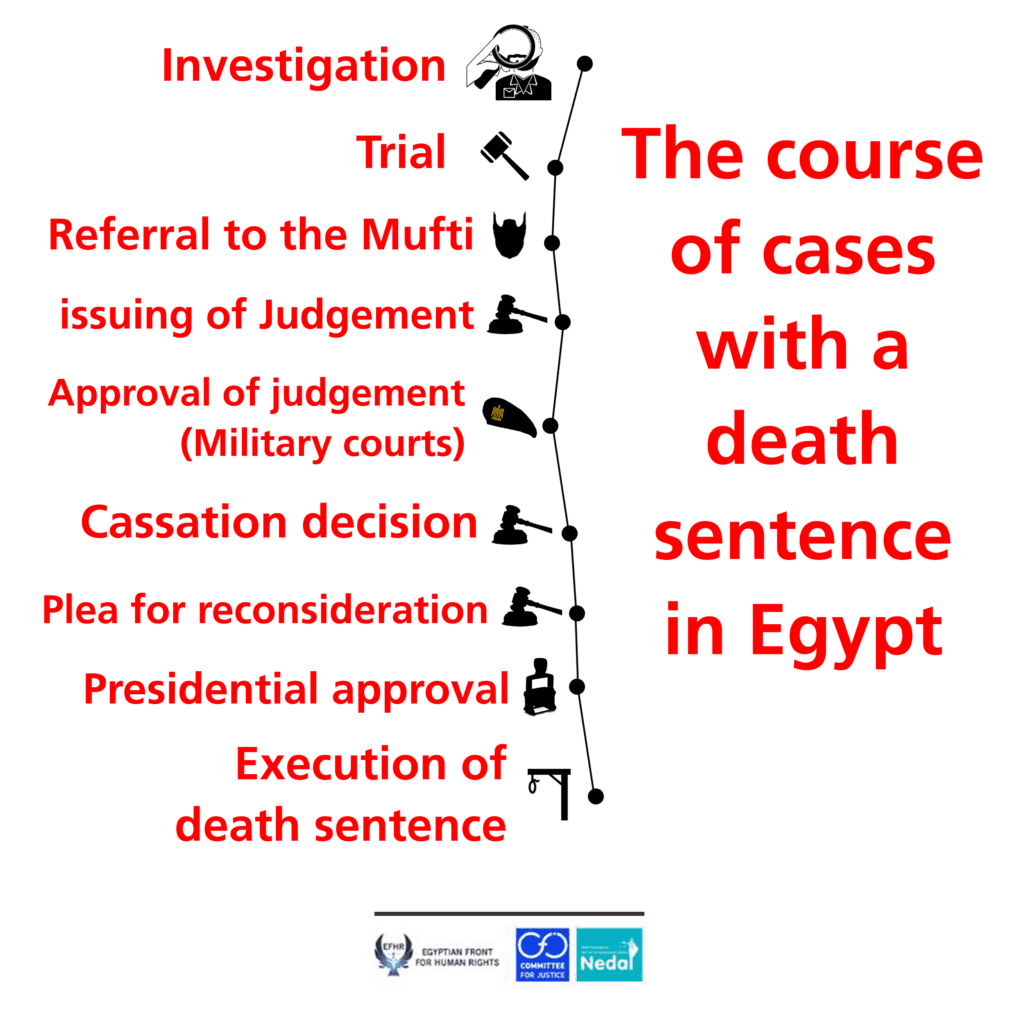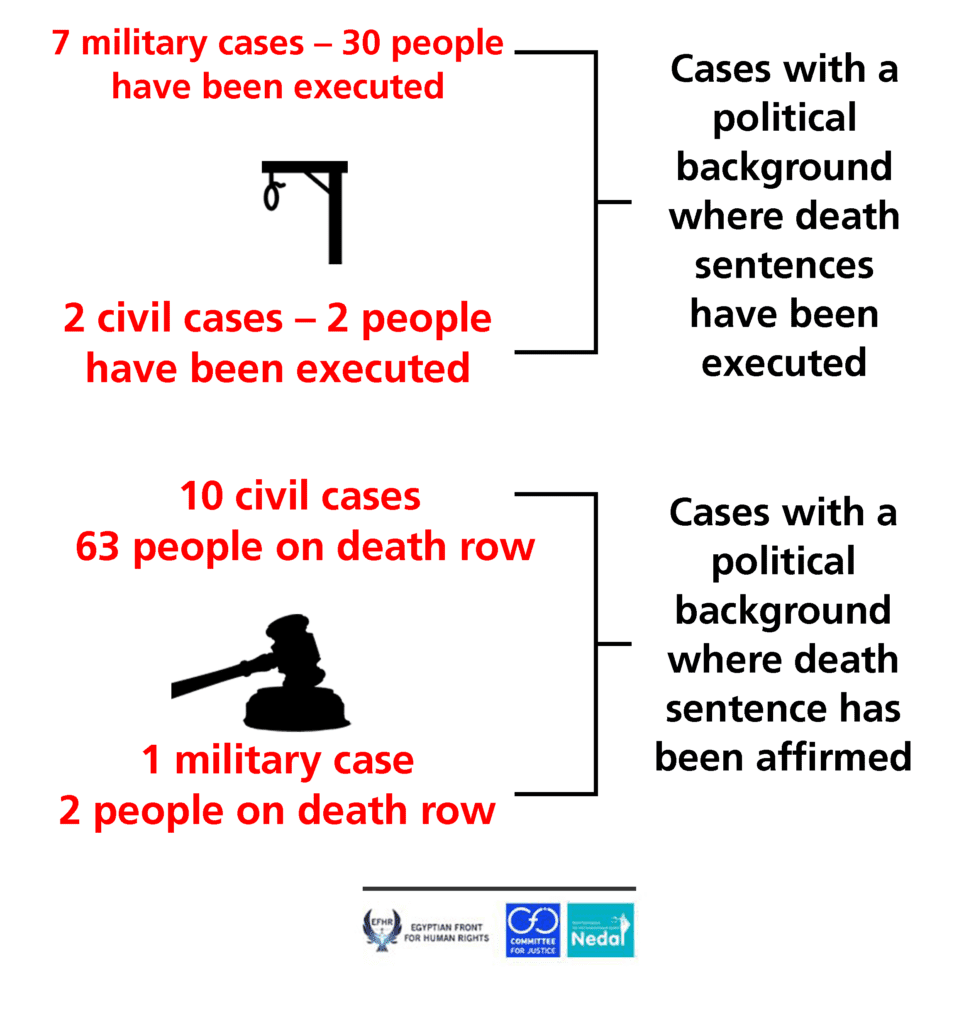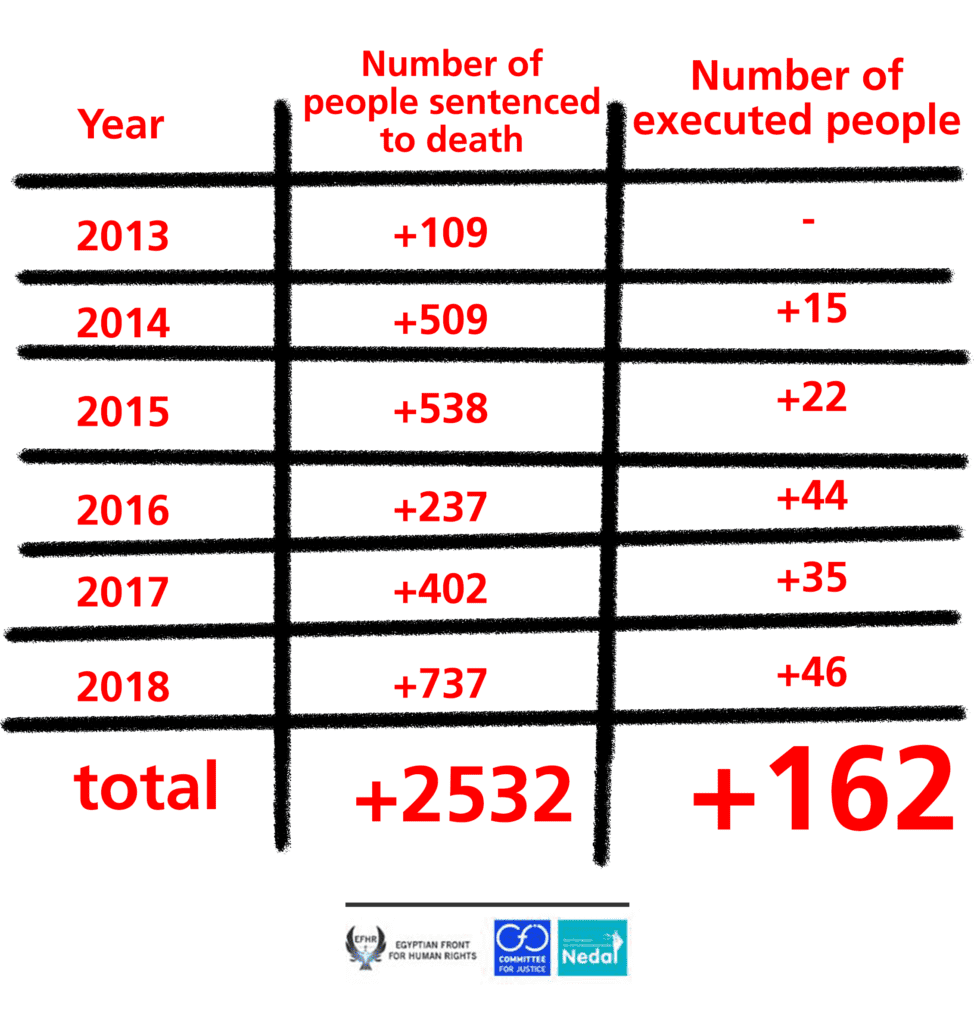Press release
Geneva (11 February 2019)
The Egyptian Front for Human Rights, Committee for Justice and the Arab Foundation for Civil and Political Rights call on Egyptian authorities to halt the execution of further death sentences and to establish a moratorium on such punishment until a broad societal dialogue on that matter takes place, in line with Egypt’s international obligations.
According to documented cases presented
in the joint report “Execution in Egypt”, in the period between 2013
and 2018, Egyptian civil and military courts issued hundreds of death sentences
for defendants under criminal and political cases, bringing the total number to
at least 2532 judicial rulings. The Egyptian authorities already proceeded in
executing some of those death sentences bringing the total number of executions
to at least 165 people during the given period.
Egyptian legislation provides for at least 78 articles authorizing the use of the death penalty as a punishment for 104 crimes, in a time where the world is heading towards abolishing the death penalty. Also, in situations where a death sentence is issued, many countries lean towards suspending those sentences. There are more than 160 UN member states, with different legal systems, traditions, cultures and religious background, who have either abolished or willingly suspended the death penalty, either by law or in practice or had it suspended for a period of more than 10 years. However, prisoners in a number of countries, including Egypt, still face the death penalty.
“Looking at the past few years, we see Egypt at the forefront of the world in terms of legislation and implementation of the death penalty, in contradiction with the international context, which has been working on drying the paths leading to the implementation or execution of this punishment,” said Mohamed Sobhi, executive director of the Arab Institute for Civil and Political Rights.

The three organizations monitored the use of the death penalty arbitrarily by the Egyptian Judiciary, following the ousting of the Egyptian past President Mohamed Morsi on the third of July 2013. During that time, Egypt was stormed by a wave of violence which largely targeted security forces, after the army and police used excessive force to disperse Rabaa and Al-Nahda sit-ins leaving around 1,000 people dead, according to international human rights statistics.
Ahmed Mefreh, executive director of Committee for Justice said: “The Egyptian authorities have carried out executions in a number of cases whose litigation procedures have not been exhausted, in a clear violation of the standards of international law and Egypt’s international and regional obligations, as in the case known as “Kafr El-Sheikh stadium” where the death penalty was executed against five defendants, despite the emergence of evidence that proved their innocence, which was completely ignored by the military court and thus the death execution was implemented. Also, in the case known as “the guard’s death”, where the defendant was subjected to enforced disappearance and was forced to confess under torture. Not to mention other cases where the absence of guarantees of a fair trial were
clear.”

This report sheds the light on one of the most serious human rights violations that has stormed Egypt in the past critical years, in a time where Egypt takes the role of presidency of the African Union, which entails an obligation to support the regional and international human rights mechanisms. Those same mechanisms which had condemned the arbitrary issuance of death penalty by the Egyptian authorities and had recommended the suspension of such executions in a number of cases.
“Egyptian President Abdel Fattah Al-Sisi should use his constitutional powers and/or legal
authority to pardon or commute death sentences. Also, the current parliament should review dozens of Egyptian laws which provide for the death penalty,” said Karim Taha, director of the Egyptian Front for Human Rights.

Based on the above, and in line with Egypt’s international obligations, the three organizations call upon the Egyptian authorities to:
- Abide by its international and regional commitments to protect human rights.
- Respond immediately and unconditionally to all recommendations presented by the international community towards establishing a moratorium on the death penalty.
- Suspend all execution of death sentences, especially in military cases, where there is no scope for a fair trial guarantees, besides the exceptional and politicized terrorism panels, particularly those in which sentences have been issued since July 2013, as well as criminal panels.
- Submit proposals to amend all laws that provide for the death penalty. In particular resolution no.136 of 2014, amendments to the Penal code and the Criminal code procedures, which took away from the rights of the defendants to a fair trial. In parallel, Egyptian judicial authorities should open independent investigations with the authorities responsible for the violations suffered by the defendants during the course of litigation.
- Respect the right to an equitable hearing of cases, which includes all procedures and guarantees for a fair trial, in accordance with international and African standards.
- Respect and protect the right of everyone to access information related to issued death sentences including all relevant information or documents, and to be aware of the importance of the availability of information regarding the death penalty to the general public. Also, Egypt should commit to the not executing a death penalty in secret, as confidentiality with regards to people who are executed constitutes a violation of human rights standards.






